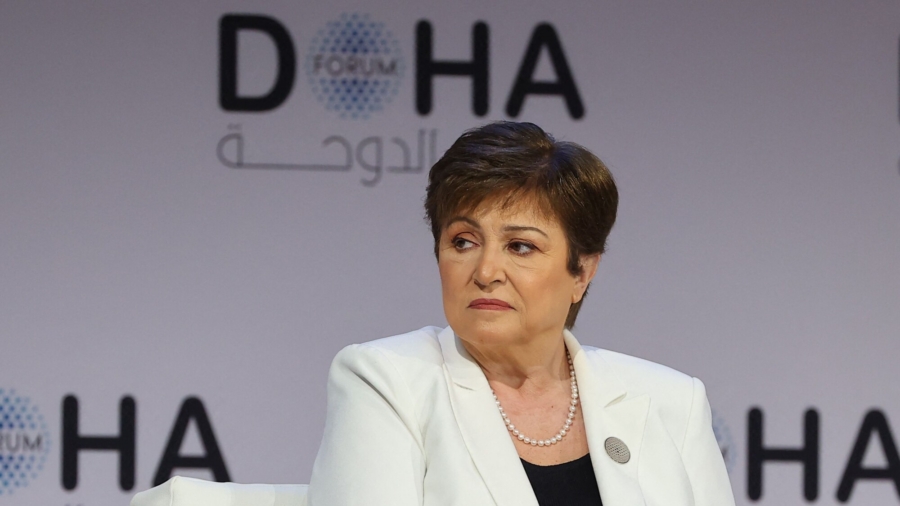The head of the International Monetary Fund told attendees at a forum in Dubai on Tuesday that the IMF has “no problems” with Russia and has no plans to eject the country as a member.
Kristalina Georgieva, the IMF’s managing director, made the remarks while speaking at the two-day World Government Summit in the United Arab Emirates, where experts were discussing governance policies and models.
She was asked by a panel moderator as to why the global lender hadn’t kicked out or suspended Russia from the IMF over its invasion of Ukraine.
“We have no problems with Russia,” Georgieva replied, adding that the IMF’s Moscow office is currently not operational.
Georgieva explained that IMF rules require member countries to fulfil certain economic and financial obligations with respect to the Fund and that Russia continues to meet these commitments.
Russia’s obligations to the IMF “are currently being followed and we want to stick to rules-based governance,” she said, suggesting a move to eject Russia from the IMF would break its own rules for membership.

Asked how the IMF would go about suspending Russia, Georgieva said that the only way this could happen was if its board were to decide that it does not acknowledge the legitimacy of Russia’s government.
“The [IMF] Board can only suspend them if the membership of the Fund says that we do not recognize anymore this particular government and that is a very tall order,” she said.
Georgieva added that “we all know for this war to end there has to be dialogue.”
Her remarks came as Russian and Ukrainian negotiators were meeting in Istanbul, Turkey, for the first face-to-face peace talks in over two weeks in a bid to move both sides closer to ending hostilities.
Ukrainian officials are hoping to secure Russia’s cooperation in resolving the humanitarian crisis in Ukraine, as well as agreement on a cease-fire.
“The minimum programme will be humanitarian questions, and the maximum programme is reaching an agreement on a ceasefire,” Ukrainian foreign minister Dmytro Kuleba said on national television.
“We are not trading people, land or sovereignty,” he said.

In a video address ahead of the talks, Ukraine’s President Volodymyr Zelenskyy said his country is prepared to declare its neutrality, a key demand on Moscow’s part, and is open to compromise on the fate of the Donbass, the contested region in eastern Ukraine.
“A new round of negotiations is ahead, because we are looking for peace. Really. Without delay,” Zelenskyy said.
Kremlin spokesperson Dmitry Peskov told reporters in Moscow that no substantial breakthroughs had been reached in talks so far but that the decision to proceed with face-to-face negotiations in Istanbul is “important” and provides an opportunity for the sides to move forward in a “focused, tighter, and meaningful way,” according to state-backed press agency Tass.
He declined to give more information, saying that to do so could hamper the process.

NATO member Turkey shares a maritime border with Ukraine and Russia in the Black Sea, has good ties with both, and has sought to mediate the conflict.
Turkish President Tayyip Erdogan welcomed the negotiators in Istanbul on Tuesday, saying that a “cease-fire will benefit all parties” and that a “fair peace will have no losers.”
“A prolonged conflict is not in anyone’s interest,” Erdogan said, adding that he hopes the Turkey-mediated talks “will lead to auspicious results for both countries, the region, and the entire humanity.”

More than a month into the conflict, more than 3.8 million people have fled abroad, thousands have been killed and injured, and Russia’s economy has been hammered by sanctions.
The IMF has said it expects the sanctions will lead to “a bad recession in Russia” and spillover impact on neighboring countries.
“Beyond the suffering and humanitarian crisis from Russia’s invasion of Ukraine, the entire global economy will feel the effects of slower growth and faster inflation,” the IMF said in a blog post earlier in March.
There are three main channels for the transmission of negative impacts of the conflict, according to the global lender.
The first is in the form of higher prices of commodities like food and energy, which would push up inflation and weigh on consumer demand.
The second is that Russia’s and Ukraine’s neighbors would face a historic surge in refuge flows, along with disruptions to trade, supply chains, and remittances.
The third is that reduced business confidence and higher investor uncertainty would weigh on asset prices, tightening financial conditions and possibly triggering capital outflows from emerging markets.
From The Epoch Times

